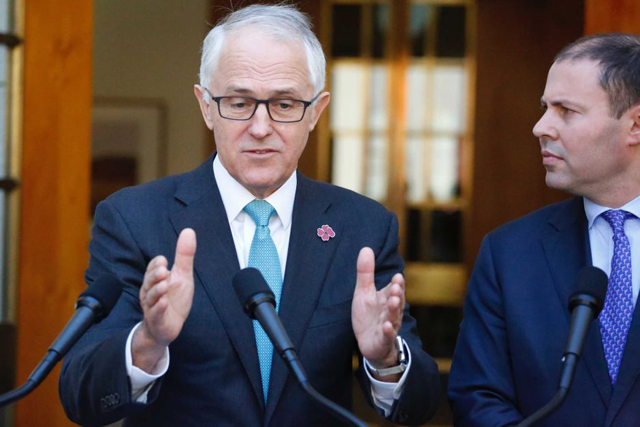Our leaders have abandoned the arts of listening and reflecting.

Our political leaders can talk, but can they really listen? PHOTO ABC
Political life is nothing if not a buzz – all the hoopla of the campaign followed by a life of meetings, speeches, interviews, openings, launches, rallies, more meetings, more speeches. Busy busy busy.
As an advocate for climate action I’ve tried to engage with many politicians of all persuasions. I’ve found them all smart people and conversations have invariably been interesting and cordial. All have agreed that climate change is a problem that must be addressed.
But nearly all discussions left me with the uneasy sense that this was just one of a long line of events in that political day, destined to be put aside when the next event came along.
Looking back at the hundreds of climate-related gatherings I’ve attended I can recall just one politician from either of the two major parties spending time in the audience. That’s aside from the odd minister who opened a conference then departed soon after speaking.
In the cauldron of electoral and party politics, politicians seem to have lost the habit of reflection. The long list of missteps in climate policy over the past few years, I’m convinced, are a product of a dangerous resistance among government ministers to objective, expert information.
Take prime minister Malcolm Turnbull’s and environment minister Josh Frydenberg’s crazy arguments that our coal has a long-term economic future, is good for India, and can be shipped in huge quantities through the Great Barrier Reef without posing any threat to the reef’s future.
Or the assertion of multiple Turnbull government ministers that South Australia’s power blackouts were mainly due to that state’s wind and solar power, contrary to the advice of chief scientist Alan Finkel – Malcolm Turnbull’s appointment – and the National Energy Market Operator.
Or the PM’s January decision, against the overwhelming weight of advice from Australian economists, to rule out the most cost-effective tool for reining in emissions, a price on carbon.
Or the Turnbull government’s repeated claim that we’re meeting targets when its own data show national carbon emissions have climbed by an average of 3.75 per cent a year since the carbon tax was abolished.
Here in Tasmania, environment minister Matthew Groom glossed over a 20 per cent rise in the state’s energy emissions since 1990 when he asserted that Tasmanian per capita carbon emissions were “amongst the lowest of any reporting jurisdiction in the developed world”.
We know how both Groom and the PM justified those last two claims, by invoking 20-year-old land-use accounting protocols which nailed a last-minute agreement at the Kyoto climate meeting – protocols whose main use today is to hide the impact of fossil-fuel emissions.
There’s a huge weight of evidence, including from government sources, that all of the above ministerial statements are not just wrong, but dangerously so because of the way they continue to undermine effective counter-action. Party politics explains a lot of this, but not all.
I believe that government MPs are essentially decent people. I don’t believe they would have countenanced such statements if they had fully grasped the huge present and future impact of fossil-fuel emissions on global climate and the potentially crippling cost of turning this around.
Terrorism, rogue states and bank failure are said to be our biggest military and economic security threats, but the US military high command and Australia’s finance industry regulator (APRA) both say the pre-eminent security threat is climate change. End of story.
Governments’ primary role is to keep citizens safe. With each day that passes, far from keeping us safe from climate change, the federal and state governments are making us less so. The primary culprit is politicians’ individual and collective ignorance of what’s now happening to the climate.
It’s incumbent on us all to understand what is safe and what isn’t and behave accordingly. An ordinary citizen who puts others in danger can’t offer ignorance as an excuse in a court of law. In the court of public opinion, we should be demanding no less of our leaders.
